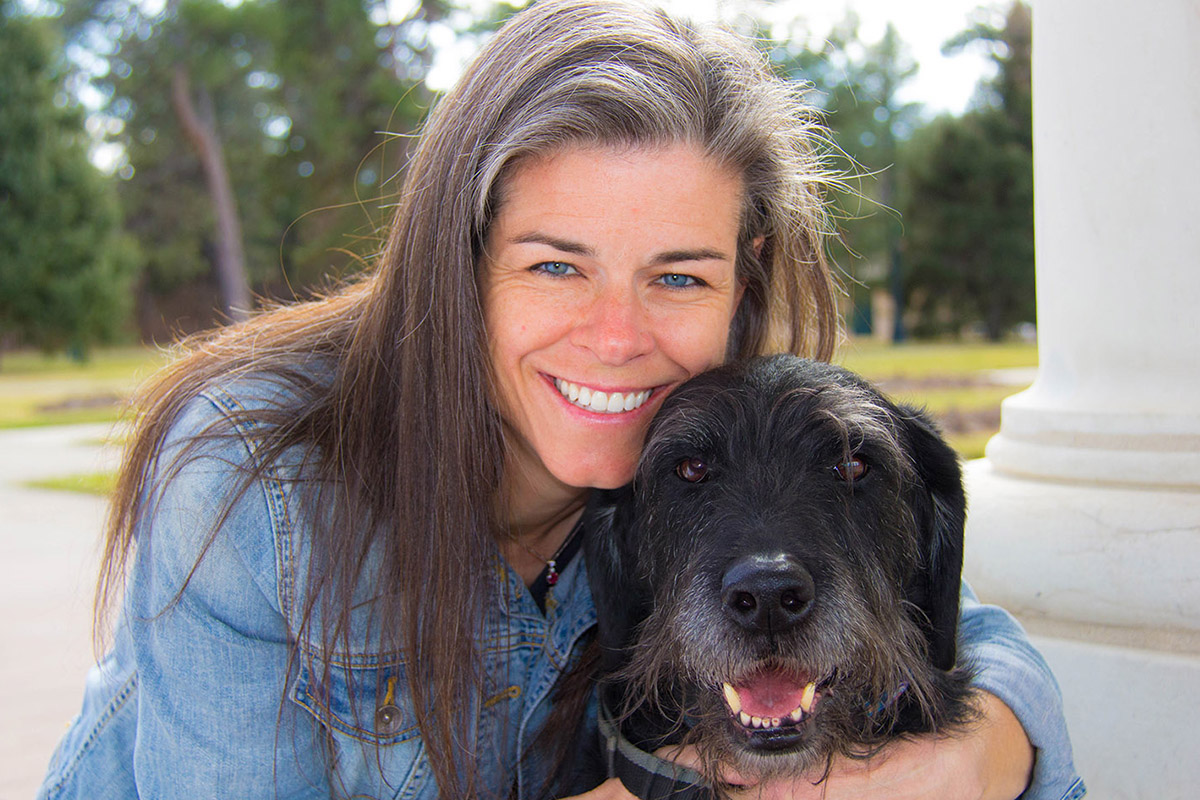Golden retrievers are known (and loved) around the world – they’re friendly, fiercely loyal, excellent service dogs and good with kids. But for all that they add to their owners’ lives, veterinarians and experts on canine health have long puzzled over a sad fact: a significant percentage of retrievers – believed to be larger than other breeds – contract certain cancers and die at relatively young ages. After years of speculation on why this happens, a foundation devoted to advancing the health of animals has launched the largest study ever on retrievers and cancer, modeled on the famous Framingham Heart Study which changed the course of cardiovascular care in humans. Dr. Missy Simpson of the Morris Animal Foundation is an epidemiologist and a veterinarian, and in the first of a series on leaders among us, she speaks from Denver on the goals of the Golden Retriever Lifetime Study, the depth of the owners’ commitment to the study, and what it might mean for cancer care in humans.
What is the biology between humans and dogs?
It is sometimes remarkably similar. To take just one example, bone cancer is almost identical in dogs and people. There is a lot of data that show certain types of cancer are overrepresented in golden retrievers, and that the incidences are increasing, but it has never been tracked diligently. It seems like we are seeing more cancer, but we can’t be entirely sure until we have valid data.
How is the Golden Retriever Lifetime Study similar to Framingham?
This is a cohort study that enrolled disease-free dogs, and this is the most effective way to study the natural history of disease progression. Framingham established the same base line – no one in that study was diagnosed with heart disease when they were enrolled. Clean slate. And like Framingham, we are focused on generating new “leads” as opposed to confirming what is already known about these dogs. We might not solve the mystery, but we will understand a lot more about it and ways we might be able to help these dogs live longer.
What could be some of the study’s implications for human health?
Our primary goal is to improve the health of dogs, but what we find may help human health researchers ask new questions about the development of cancer and other diseases in humans. We are looking for correlations between risk factors and the actual development of disease. Dogs share our world every day.
They get many of the same diseases, not just cancer but diabetes, arthritis and heart disease. They can be even more highly exposed to potential bad stuff than humans. They are one of very few species that naturally develop autoimmune diseases. They have nutritional, environmental and genetic risk factors. Are any of those factors relatively more important? We would like to know that. And keep in mind that with this study, the endpoints are in 10 to 12 years, which is a much shorter period of time than comparable human studies. We’ll get the read out faster.

Blaze is the 3044th (and last) dog enrolled in the Golden Retriever Lifetime Study (photo courtesy of his owner, Sharon Albright)

Missy Simpson with her dog Jammies, who is “an ardent study supporter and golden retriever fan boy”
Based on your experience, is there anything that you are focusing on as a potential root cause of disease?
Everybody has their own suspicions, and things they want to chase down. We have done our best to get a breadth and depth of data, and to look at a lot of different questions. Some examples: we are asking about exposure to pesticides. We want to know what kind of bed the dogs sleep in and what kind of water they swim in. We are collecting biological samples and studying their genetics. We have dogs from the contiguous 48 states, so we may find that disease is more prevalent in some regions. My feeling is that like most complex chronic diseases, there won’t be one thing that stands out. It will be a combination of things. Look at Framingham: it turns out no one thing causes heart disease. I will be very surprised if we find a virus (for example) that is the direct cause of, say, bone cancer.
What are the primary endpoints?
The primary goal is to identify the potential risk factors for the development of four types of cancer common in golden retrievers: lymphoma and osteosarcoma (which are similar to the same cancers in humans); hemangiosarcoma; and mast cell tumors. We also want to identify genetic variants associated with common cancers: if we can find a specific genetic marker for cancer, we can strategize on how to breed that out of retrievers over time. And we expect to generate a lot of new and significant data on risk factors for cancer – such as, perhaps, what the dogs eat and their weight. It is a gold standard study, never done before, and we will be submitting our research to peer-reviewed journals as we move forward. We are getting to the point where we will have enough data to publish.
How many dogs have you enrolled?
We started with a little over 3,000 dogs, which took us two and a half years to fully enroll. That is what we needed to be statistically reliable. It is how many we need to get roughly 500 cancer diagnoses of our four primary cancers.
Have you lost some dogs to cancer already?
Yes, I am sorry to say we have. Of course, we knew going in we would see cancer is our goldens. But there is encouraging news, too. As a vet, I can say that we have a lot of positive outcomes after a cancer diagnosis, and that cancer is now one of the most commonly cured diseases in dogs. But it is tough to lose a dog. It doesn’t make it easier, but the retriever community in the study rallies around those owners. Having dogs is bittersweet. I guess it’s the contract we sign when we bring them home. Sometimes people do everything right and their dogs die quite young.
What do you say to them?
Any chronic disease has an insidious onset. When I was in private practice, owners would feel guilty – they caught it too late, it was their fault. Dogs have very strong survival instincts, and they actually hide illness as long as they can. They don’t show us any sign of a problem until it is well down the road. It’s not like calling a family member who always starts with a list of his latest aches and pains. Dogs are much cagier about what they are feeling. So, watch for little changes in energy, strength – anything that seems a bit off.
You are asking a lot of the owners and vets who participate, with all the questionnaires, ongoing vet visits, and testing.
We are. I can’t commend them enough. It is a remarkably dedicated group of people. A lot have bonded through the study. No one wants to lose a 7-year-old dog to cancer. This community is hungry for information. Everyone at Morris Animal Foundation is deeply committed. I have been trained as a scientist, so I live in a world of data and research, but this is closer to a crusade. We want to do right for these owners, for these dogs, and the owners who will come after us.
While the study continues, do you put on your “vet hat” when you talk to them?
I do. I get on my soapbox about obesity. Dogs mirror our lifestyles. A healthy diet and exercise – I know, nothing new – can really make a difference. It’s especially tough with goldens because they are food oriented and easy to train that way. But if your lifestyle isn’t healthy, you are putting them at risk. Dogs are so resilient. It is an inspiration. They are so, Go Team!
And the road ahead?
We will follow these dogs through their lives and use the dataset to understand their health in new and important ways. It is a $32 million study, and we have great support from public and private donors, but we aren’t fully funded yet so we have some work to do. I feel confident we will get there.
For more information on the Golden Retriever Lifetime Study, go to https://www.morrisanimalfoundation.org.

